DCPA NEWS CENTER
Enjoy the best stories and perspectives from the theatre world today.
Enjoy the best stories and perspectives from the theatre world today.
This article was published on February 19, 2019
Video by DCPA Video Producer David Lenk and Senior Arts Journalist John Moore.
In this daily five-part series for the DCPA NewsCenter, we introduce you to the plays and playwrights featured at the Denver Center’s 2019 Colorado New Play Summit through February 24. Over the past 14 years, 29 plays introduced at the Summit have gone on to be premiered as fully staged productions on the Denver Center Theatre Company’s mainstage season. Today: Bonnie Metzgar, author of You Lost Me.
The play in a nutshell: In 1824, young Ann Harvey saved 160 Irish people from a wreck off of Newfoundland’s Shipwreck Coast, making her an instant hero along this remote and rocky shore. Almost 200 years later, the Harvey family homestead has become the Shipwreck Inn, and present-day proprietress Ann Harvey has just started a new blog for the landmark with the support and ridicule of her teenage nephew, Joe-L.
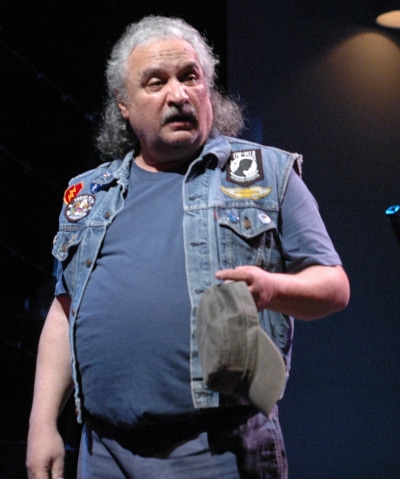
Manuel Roybal in Curious Theatre’s ‘The War Anthology,’ directed by Bonnie Metzgar.
The playwright at a glance: Bonnie Metzgar is a Chicago playwright, director, dramaturg and producer who was the Associate Artistic Director at Denver’s Curious Theatre Company from 2004-2007. It was there she directed The War Anthology – 10 short plays about war based on single photographic images. It was the first known writing collaboration that included three Pulitzer Prize-winners among its contributing writers: Tony Kushner, Paula Vogel and Suzan-Lori Parks, along with seven other national and local writers. It was at that time Metzgar and Parks came up with the idea for 365 Days/365 Plays, which grew to become the largest theatrical collaboration in U.S. history. Metzgar wrote the first draft of You Lost Me as her thesis project while obtaining her master’s degree from the University of Iowa. She went on to serve as Artistic Director for the About Face and American theatre companies.
The director at a glance: Wendy C. Goldberg is the Artistic Director of the National Playwrights Conference at the Eugene O’Neill Theatre Center in Waterford, Connecticut, and has directed five plays for the Denver Center Theatre Company.
Here is more of Bonnie Metzgar and Wendy C. Goldberg’s conversation with DCPA Senior Arts Journalist John Moore:
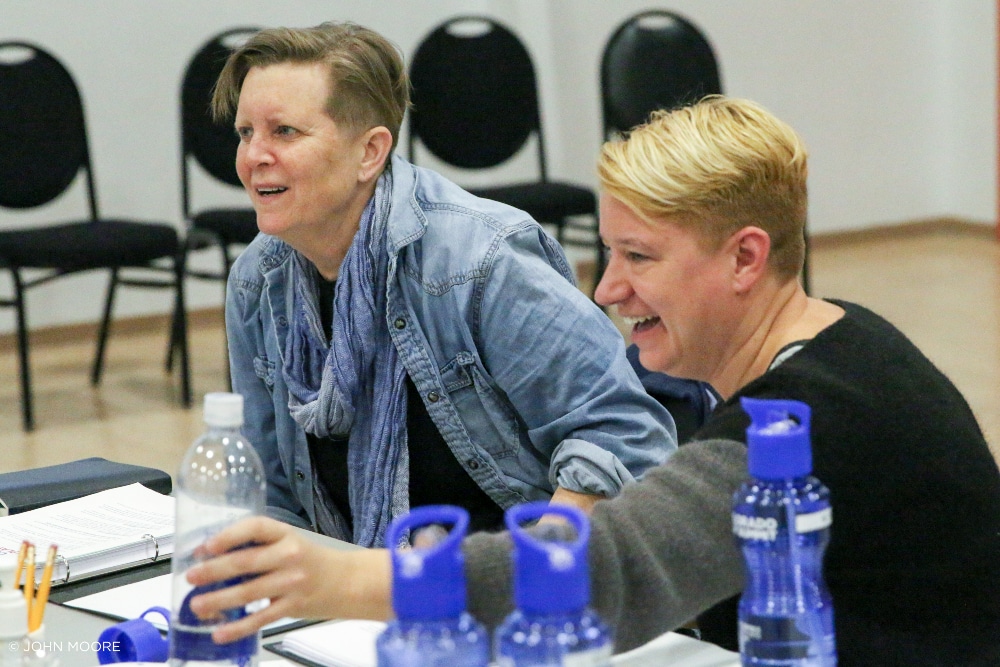
Bonnie Metzgar, left and Wendy C. Goldberg at rehearsal for ‘You Lost Me.’ Photo by John Moore.
John Moore: Bonnie, tell us about your time in the Denver theater community.
Bonnie Metzgar: I met Chip Walton from Curious Theatre Company at a conference and he invited me to come to Denver to direct a reading. That turned into three years at Curious Theatre Company, where I was an associate company member. I lived in Lafayette, and I made a lot of work here in the local community. So I do think of Denver as one of my theater homes.
John Moore: And Wendy, tell us about your day job at the Eugene O’Neill Theatre Center.
Wendy C. Goldberg: I oversee all of the new-play development at the O’Neill, which is the original home of new-play development. The idea and concept behind developing a play really never existed before the O’Neill, which is 55 years old now. I run the festival in the summer.
John Moore: Tell us about your history with the Denver Center Theatre Company.
Wendy C. Goldberg: I first came here in 2006, which was Kent Thompson’s first season and the first year of the Colorado New Play Summit. So there was a strong commitment to new work, and a desire to work with different writers the company had not worked with previously. I have directed five shows here, and a couple of Summit readings. They’re all really special to me, for various reasons. First was Sarah Ruhl’s The Clean House [2006], followed by Lisa Loomer’s Living Out [2006]. Then I had the opportunity to direct Third, which was Wendy Wasserstein’s last play [2007]. Then came a Rebecca Gillman play called The Sweetest Swing in Baseball [2007], which we had developed at Arena Stage. And then there was Lisa Loomer’s Two Things You Don’t Talk About at Dinner [2011], which we had developed at the Summit. It’s remarkable to be back in this present moment working in Chris Coleman’s first season as Artistic Director.
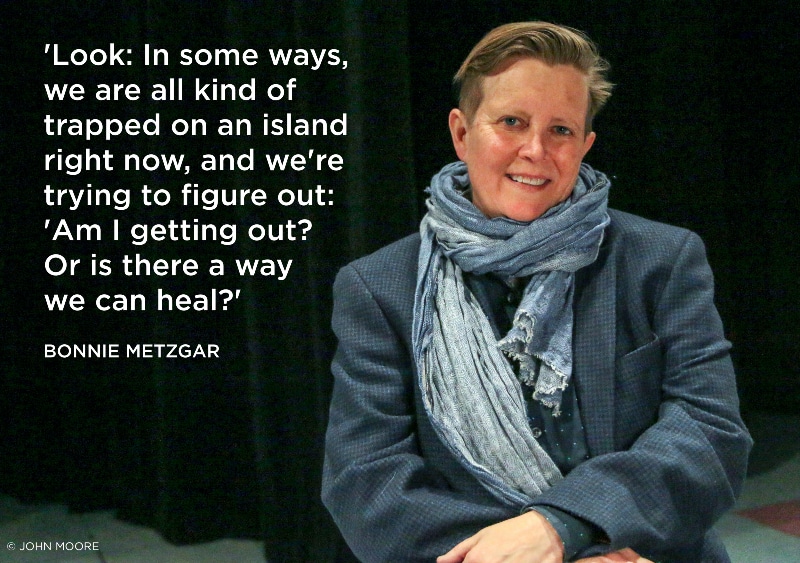
John Moore: Bonnie, introduce us to You Lost Me.
Bonnie Metzgar: So You Lost Me is a play that is about Newfoundland, which is in Canada. The southern coast of Newfoundland has had some of the most shipwrecks in the world. Many, many souls have been lost there. But the play is also about Americans and how, as we travel around the world, we are actually looking for ourselves. The main story takes place in the 1820s, when there was a shipwreck and all of these Irish immigrants washed up on the southern shore of Newfoundland. There was a kind of cultural smashing together in this shipwreck that forever changed the fate of Canada. The play is about all of the ways people who are thrown together inevitably leave indelible marks on each other’s lives.
John Moore: What’s the story of this particular shipwreck?
Bonnie Metzgar: So you have a 17-year-old girl named Ann Harvey, her 11-year-old brother and a dog named Hairyman who took a boat out and ended up saving 160 people off of a rock, miles offshore.
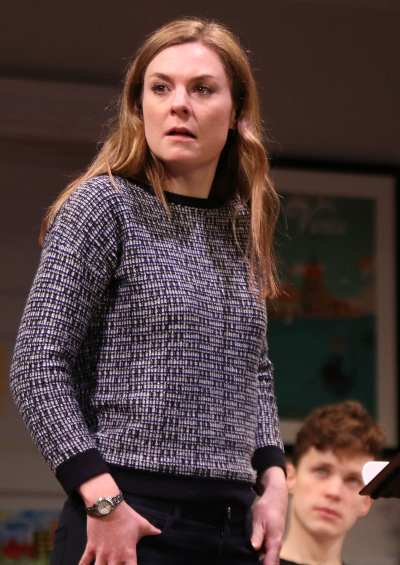
Anastasia Davidson in ‘You Lost Me.’ Photo by John Moore.
John Moore: How did they do it?
Bonnie Metzgar: There’s a rope. They tie a stick to the rope. They stick the rope into the dog’s mouth. The dog swims to the rock. And then, one by one, this 17-year-old girl pulls these people, hand over hand, off this rock and saves them. But what’s also interesting to me is that there is no account from that shipwreck that corresponds to any other account about how many people were saved and how many people were lost. So we don’t even know who the people were who died. They are the literal lost. But the play is about all the different ways we get lost.
John Moore: Clearly, Ann Harvey would have been worthy of her own play. But you also make your story contemporary by introducing her modern-day descendants who run an inn catering to shipwreck tourists. What did you find interesting about the mindset of people who are drawn toward scenes of disasters, whether it’s the grassy knoll or the World Trade Center or this famous shipwreck?
Bonnie Metzgar: That’s the question, isn’t it? What is it in humans that makes us drawn to landscapes of tragedy? I know I am. I want to go to a place where there was a shipwreck. But you know what’s interesting about Newfoundland? It has some of the most entrenched unemployment in the world. People there feel stuck. It’s hard to get off of an island when you live there. So there was something interesting to me about having a descendant of Ann Harvey, this woman who saved all those people, feeling trapped on this island herself. And then we have these American tourists who feel compelled to go to where this historical tragedy happened, and yet there is this present-day tragedy playing out all around them as well.
John Moore: So when you have all these people who are stuck, whether by unemployment or addiction or disease, how do you get unstuck?
Wendy C. Goldberg: I think what you have here is a collision of time. When these present-day characters have experiences with characters from the past, they have revelations and discoveries that help them to move forward. It’s deeply human and deeply real and very genuine and, I think, done in a theatrical way that is really, really incredible.
John Moore: For a play that spans two centuries, why is this the right play for right now?
Bonnie Metzgar: Look: In some ways, we are all kind of trapped on an island right now, and we’re trying to figure out: ‘Am I getting out? Am I going to Canada? Is there a way we can heal and we are together? Can I encounter this divide we are having as a nation and meet this other person who is really different from me? Is that possible, or am I just going to bail?’ That really is the central question of the play. Even though all these people are stuck, there’s a moment where the play is just asking: ‘Do we all get another chance? Is there something else that’s possible here?’
Wendy C. Goldberg: I think that’s right: Can we move forward? Can we heal? It all feels so deeply relevant to me. And at the same time, this play is a stunning theatrical experiment. This is a startling little puzzle that we’re putting together right now. Bonnie is pushing the boundaries of theatrical form.
John Moore: Bonnie, this is all sounding like a very serious conversation, but you also said this play is a comedy.
Bonnie Metzgar: Oh, yeah. At its heart there are these two teenagers who are really wahoo crazy – because they live on this rock. And all they dream about is headbanging music. They are disruptive change agents – because that’s what teenagers are. But in this world where people are stuck, teenagers believe anything is possible. But they are teenagers, so … they’re kind of jackasses, too.
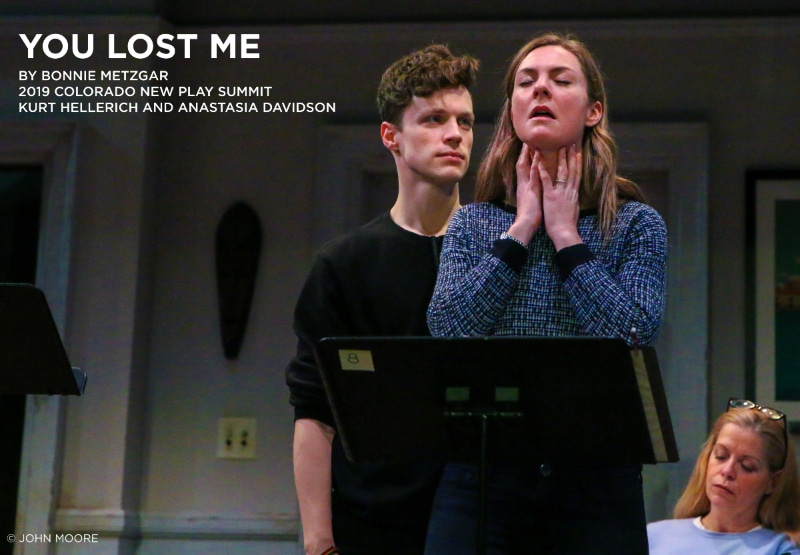
John Moore: Bonnie, what are your impressions of your first Colorado New Play Summit?
Bonnie Metzgar: Oh my God, it’s amazing. I’ve never really been part of something like this where it’s two weeks of people working on so many incredible plays at the same time.
John Moore: As we speak, you are about to have your first public reading before you go back into your writing room and do it all over again. Tell me about the opportunity the second week of the Summit affords you.
Bonnie Metzgar: It is so unique. When we got to Denver, I had not yet cracked the last half hour of the play, which of course is the most important part. How does it all come together? What do we really want to say? Just today we crafted a whole new ending. We have no idea if it’s right. No idea. We get to see it in front of a local audience, and then we get to gather all of that information about what worked and what didn’t work. Then we’ll go back to work for another week, and I’ll probably write another ending. I get two cracks at this in front of two different audiences a week apart. I don’t know of anywhere else in the world where that’s done.
John Moore: Wendy, you have always been a big fan of the Denver Center’s Women’s Voices Fund, which Kent Thompson co-founded in 2005, and it is now the largest endowment of its kind in the country at $1.5 million – all to support the telling of stories by women playwrights and directors.
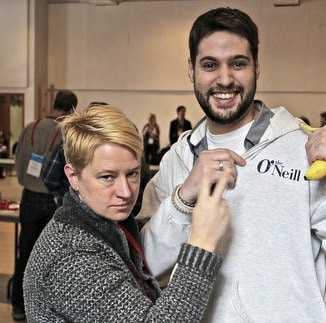
Wendy C. Goldberg directed Idris Goodwin’s ‘Victory Jones and The Incredible One Woman Band’ at the 2014 Colorado New Play Summit. Photo by John Moore.
Wendy C. Goldberg: Yes, I am a huge fan. Kent Thompson was the first person I ever worked with who really took a strong look at the inequalities in the American theatre, both on stage and behind the scenes, and did something. I helped him during the early days when he was hatching this incredible vision. Little by little it grew, and now it’s one of the largest of its kind dedicated to supporting women artists.
John Moore: I also want to take the opportunity, since I have both of you titans here together, to ask you for a status report on how we’re doing in the American theatre right now. Is this generation of playwrights telling the right stories? Are we challenging audiences enough? How are we doing?
Bonnie Metzgar: It is safe to say we’re in a moment of transition. This is an exciting time. It feels like, right now, we are in this moment where the American theatre is deciding who it’s going to be. And who it’s going to be for. There are more leadership opportunities for women and people of color. That is absolutely going to continue this change. But I think the big question is, how quickly? And will it be quick enough for us to not lose a generation of audiences?
Wendy C. Goldberg: I also think it’s moving in a good direction. People are vocal. People are active. We’re moving into this next phase of what the American theatre is going to be. As we continue to see new leadership come in, I think we’re going to continue to see change.
Bonnie Metzgar: I also want to say: If there’s an example of how the American theatre is in a moment of change, it is being lived right here at the Colorado New Play Summit. On our first day in the room, I looked around at the incredible diversity of voices, and of artists, and of different perspectives all together here. That shows me that the future is really bright. If one of the great institutions in this country can do that and it can happen here, it can happen everywhere.
John Moore was named one of the 12 most influential theater critics in the U.S. by American Theatre Magazine in 2011. He has since taken a groundbreaking position as the Denver Center’s Senior Arts Journalist.
In The Ricketson Theatre
Cast and crew:
